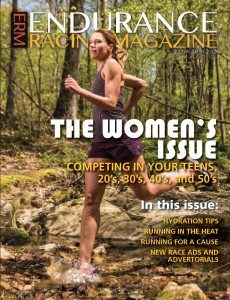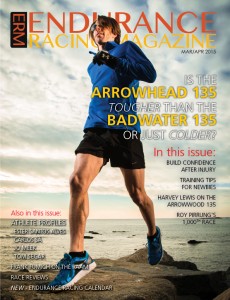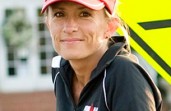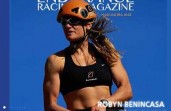 Reprinted by Permission By Meredith Terranova
Reprinted by Permission By Meredith Terranova
There are a few essential factors to consider when preparing to race under potentially hot and humid conditions:
- Fluid and Electrolyte Intake
- Fuel Absorption
- Keeping your core temperature cool
Fluid and Electrolyte Intake:
You can know exactly what your body needs, but on a hot, and more importantly humid, day all the rules might change.
On a humid day, things to pay attention to:
- Are you sweating an excessive amount?
- Are you drinking a significant amount of fluid?
- Are you matching your increase of fluid intake with more electrolytes?
Additionally, as you check the weather by the minute pre-race, there are some things to consider as you hydrate in the days leading up to your event:
- Fluid Consumption
- Electrolyte Consumption
- Urine Color
Excessive plain fluid consumption will create a diuretic effect, so get and stay hydrated but DO NOT over-hydrate. Drink 80-100oz per day max. Make sure that you are including electrolytes into your pre-race hydration, especially if it is going to be a hot and humid day.
On the morning of the event, make sure you take electrolytes pre-race. The technique is similar to carb loading but it’s done with electrolytes. The goal is to condition the cells and the blood stream to maintain a higher level of electrolytes, which can be called on later to maintain a higher activity level for a longer period of time.
All performance is dependent on the 4 alkaline minerals, sodium, potassium, magnesium, and calcium, along with chlorides, phosphates, and sulphates. We know that a long athletic event or even a hard workout will deplete the electrolytes.
Electrolyte Loading. The technique for electrolyte loading is to sip on small amounts of fluid before your race on the morning of, and take in anywhere from 300-600mg of sodium. (this will depend on your body’s tolerance) The high concentration of sodium will permit a buildup of electrolytes with the potassium stored in the cells and the sodium in the blood stream.
You can then drink as much water as you need immediately before your event. The idea is to be out of the starting gate before the body and its marvelous kidney control system reacts to the high mineral concentration and dumps the high potassium, magnesium, phosphates, etc. into the bladder. As soon as you start running or cycling or whatever, the kidneys conserve everything the water and electrolytes, and very little is dumped into the bladder. Therefore, your pre-loaded electrolytes will be effectively stored and available later.
Fuel Absorption (Preventing the Bonk)
When racing in the heat all of the below information is EXTREMELY important.
Eating food high on the glycemic index (a/k/a pure sugar) will result in a sugar high and sugar crash. This is true in all situations except when you are exercising and immediately following. Many athletes in an effort not to have a sugar crash during exercise have looked to some from maltodextrin (a complex carbohydrate) assuming that this product will release energy slowly into the system during exercise. However,
1) When you are exercising your insulin is blunted. Meaning, that when you are exercising and you consume a high glycemic food, you do not get a strong insulin response and hence you do not get a sugar crash. Your body is very smart and it clearly understands that when you are exercising you want to use the food or drink you consume to fuel your muscles. If insulin kicked in, the food or fuel you consumed would not get to the working muscle.
2) Athletes choose maltodextrin for the wrong reasons. Maltodextrin is actually high glycemic index food, not low glycemic. Hence maltodextrin is a good choice because it is fast absorbing, not because it’s slow absorbing.
3) Looking for that low glycemic, slow sustained energy will actually cause you to bonk prematurely. Some even consider using some fat because they are going long. Understand that we all have about two hours of stored glycogen. Once this runs out, we bonk. If you consume a slow absorbing/low glycemic food while exercising you are forcing your body to rely on its stored glycogen. The entire goal of fueling for long endurance racing is to spare your muscle glycogen. In other words do what you can to hold on to that stored glycogen. The best way to do this, outside of appropriate pace and training, is to consume primarily fast absorbing carbohydrates to fuel your exercise. This will allow you to immediately use what you consume for the working muscle, so you can spare your stored muscle glycogen.
The act of consuming nutrients that are absorbed slowly can also cause gastric distress. Consider that slow absorbing nutrients spend a lot of time in the digestive system. Doing this while exercising simply backs up the digestive system and does not allow for those fast nutrients to get absorbed. Often athletes cannot understand why they bonked when they consumed a large amount of calories. The simple answer is that they likely consumed slow calories that did not absorb before their glycogen ran out. And often you feel this through considerable stomach discomfort. (The above is based on research from Robert Kunz, MS)
This information is especially important in the heat and humidity because under these conditions your body is under additional stress. You want to keep your fueling sources simple, and easy for your body to absorb and utilize.
Keeping Your Core Temperature Cool
Keeping your body temperature (your core) cool on a hot and/or humid day is essential in being able to absorb your fuel and fluid.
When your core temperature rises, so does your heart rate and potentially shuts down your gut and ability to process your intake.
How to keep your core cool:
- Monitor or adjust your pace
- Keep a bandana around your wrist or neck with cold water or ice
- Put ice in your hat
- Don’t be afraid to carry a water bottle!
Meredith Terranova is an unltra-distance runner and owner of Eating and Living Heathly, a company that provides customized nutrition support for clients needing assistance with, among other things, weight loss, disease prevention, increased energy, improved athletic performance and better meal planning. Meredith holds a Bachelors Degree in Human Nutrition and Consumer Science from the University of Houston.
Visit: www.eatingandlivinghealthy.com












